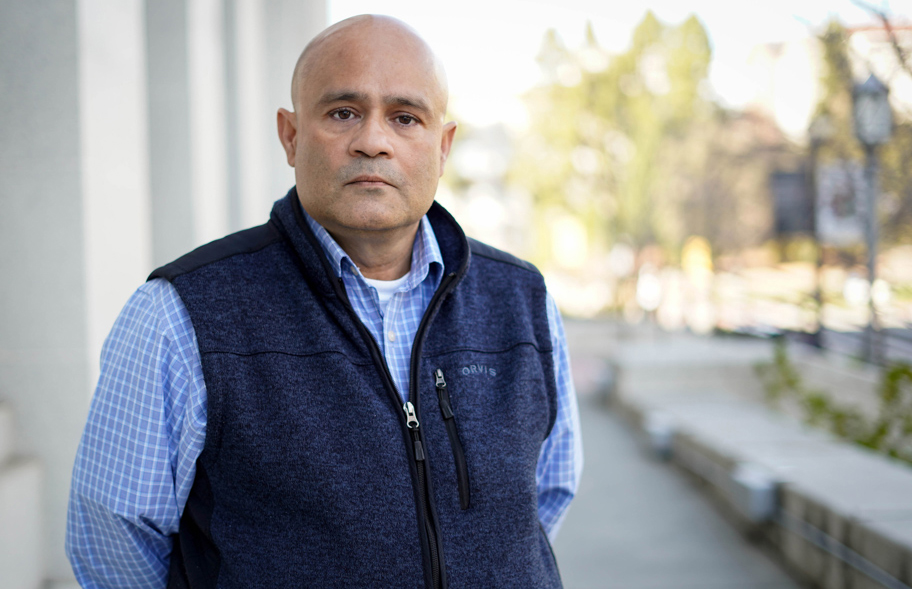
Libraries aren’t hushed houses of information. They are forums for the active exchange of ideas — and perspectives.
How isolation would impact that exchange was one of many worries eating at Liladhar Pendse, the UC Berkeley librarian for Slavic, East European, and Eurasian studies, as the pandemic took hold in 2020.
“We were all on our little islands, in our apartments, our homes,” Pendse recalls. “I wanted to bridge that divide through dialogue.”
So he hatched a plan for a series of online talks to keep the UC Berkeley Library community connected, while also providing a venue for important conversations with the broader community. The inaugural webinars focused on libraries in flux, with speakers from libraries around the globe sharing their experiences of managing change during the pandemic.
The conversations were so well-received that Pendse expanded his scope. Over the past two years, he’s organized digital discussions on global concerns, such as the war in Ukraine, and historical topics, such as revolution in Mexico. He’s hosted events for Black History Month and Asian American and Pacific Islander Heritage Month, among others. Events have featured librarians, academics, and other dignitaries from across the country, and world.
In many ways, the motivation for organizing the dialogues is rooted in Pendse’s personal experience. He immigrated to the United States in 1992 and is fluent in seven languages, making him something of an expert in building bridges to understanding.
“Whether I worked in Home Depot or a public library, colleagues from different walks of life, with different emotions and historical experiences, came together to get a job done,” he says. “That’s what I want to highlight — the commonalities which bind us.”
We caught up with Pendse to discuss the Library’s role as a forum for crucial conversations.
Tell us more about your inspiration for organizing these events.
As a librarian, I believe that we have to provide voices to those whose voices aren’t heard, such as with the Ukrainian librarian event. (Pendse organized an event in April to raise awareness about the harrowing and surprising ways Ukrainian librarians are responding to the war in their country.) The librarians are so far away from California. I wanted to hear from them about the immediate impact of one or two leaders’ decisions, how those decisions affect the local population, and how information professionals there are coping with different stressors, and shining through it by providing services.
Ultimately, I want to provide perspective, in this case, to have people think about these librarians, who provide food to their audiences in the library basement, and show the children books to keep them going. It’s important for people to hear that perspective because we aren’t there ourselves.
Why is the UC Berkeley Library the right place to host these conversations?
Part of our mission is to set information free and facilitate access to meet the information needs of our users. I look at myself as an information mediator. If somebody comes to me, and they want to find a book or a specific fact, I can help them. The same basic principle applies to these events.
We are providing information — different perspectives — to anyone who wants to listen. We are a medium of critical information exchange and critical thinking. In many ways, the events are a venue for letting people think out loud together. As a librarian, that interaction is important to me. That’s where the wonderful things happen.
How have participants responded?
I’ve gotten many nice thank-you notes from people around the world. The featured speakers have been so accommodating. I think it’s because they understand the importance of what we’re doing. For example, when we hosted the conference on revolution in Mexico, we had Paco Ignacio Taibo II as our keynote speaker. He is the director of Fondo de Cultura Económica (a nonprofit publishing group, partly funded by the Mexican government), and a prolific writer and historian. But he still made time for us.
For the Ukraine event, we had 300 participants, which was the maximum allowed on the Zoom call. We had 300 more who wanted to listen, but had to wait for the recording of the event instead. That is a testament, I think, to how people want to stay engaged. So we will keep the conversations going.
This Q&A was edited for brevity and clarity.
National Hispanic Heritage Month celebration
Thursday, Sept. 22, from Noon to 1:15 p.m.
Webinar is free and open to the public with registration.